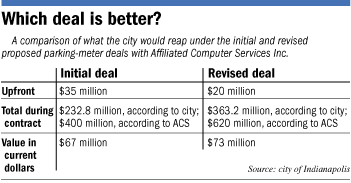Subscriber Benefit
As a subscriber you can listen to articles at work, in the car, or while you work out. Subscribe NowRecent changes to the city’s plan to lease its parking meters for 50 years offer a trade-off—the impact of which will depend on whether people continue to park at meters in downtown and Broad Ripple.
If they do in strong numbers, meter revenue will jump, and the city stands to reap a bigger share of the money than under the original lease rolled out in August. If they don’t and revenue lags, the city will get a less lucrative deal than under the initial proposal, which calls for a bigger upfront payment than the revised one.
Money from the deal will be used mostly on street and sidewalk improvements in areas near the meters.
City leaders introduced the revisions Oct. 20 after public outcry over the original plan to lease the roughly 3,650 metered spaces to Dallas-based Affiliated Computer Services Inc. The changes call for greater flexibility in removing meters, options to terminate the 50-year deal every 10 years with penalties, and more favorable terms for the city regarding advertising revenue from the meters.
Among the key differences is how the city would reap revenue. Under the initial plan, Indianapolis would have received $35 million upfront and, according to city estimates, $232.8 million in meter revenue over the life of the deal.
The new contract calls for the city to get $20 million upfront and an estimated $363.2 million over the next 50 years.
The higher share over time is based on a change in the revenue-sharing model, which, under the revised terms, gives the city 30 percent of revenue up to $7 million, and 60 percent above that threshold. That’s compared with 20 percent up to $8.4 million and 55 percent above that amount under the old deal.
That means, according to the city’s calculations using an 8-percent discount rate, the old deal would be worth $67 million today, compared with $73 million for the new deal.
But whether the city hits those projections—and whether the new deal turns out to be better, revenue-wise–depends on future meter payments.
“If traffic utilization turns out to be really good, the new scenario is going to be better,” said Sreenivas Kamma, who has studied public-private partnerships as chairman of the finance department at Indiana University’s Kelley School of Business. “If traffic utilization turns out to be less than expected, you’d prefer the original scenario.”
City officials say their revenue projections, which are based on estimates by financial advisers at New York-based investment bank Morgan Stanley, are conservative. By comparison, ACS projects much higher returns for the city of $400 million under the original plan and $620 million under the revised one.
The ability to increase revenue from the roughly $1 million per year the city currently reaps to as much as $15 million by the end of the contract depends on several factors, said Kurt Fullbeck, a project manager with the Indianapolis Local Public Improvement Bond Bank, who has worked on the financials of the parking deal.

Among the factors is adding meters in areas such as Massachusetts Avenue downtown and on Westfield Boulevard in Broad Ripple. Increasing hourly rates from the current 75 cents to $1.50 by 2012 in high-traffic areas and making it easier to pay by installing machines that accept credit cards also are expected to help.
“Indianapolis is poised to expand even more, and with that will come greater need for parking meters in areas that may not be a commercial hub now but will be in the future,” Fullbeck said.
But there are tricky variables involved. Changes in mass transit could decrease the need for downtown parking. For now, raising rates during a tough economic time also could curb usage.
“Whenever you’re estimating in the future, it’s more risk than money today,” said Rachel Smith, a finance professor at the University of Indianapolis. “[But] generally parking meters are a pretty stable investment.”
The city’s Department of Public Works Board approved the changes 5-0 last week. A City-County Council committee will review the revisions at a meeting Nov. 9.
The plan requires approval by the full council.•
Please enable JavaScript to view this content.
